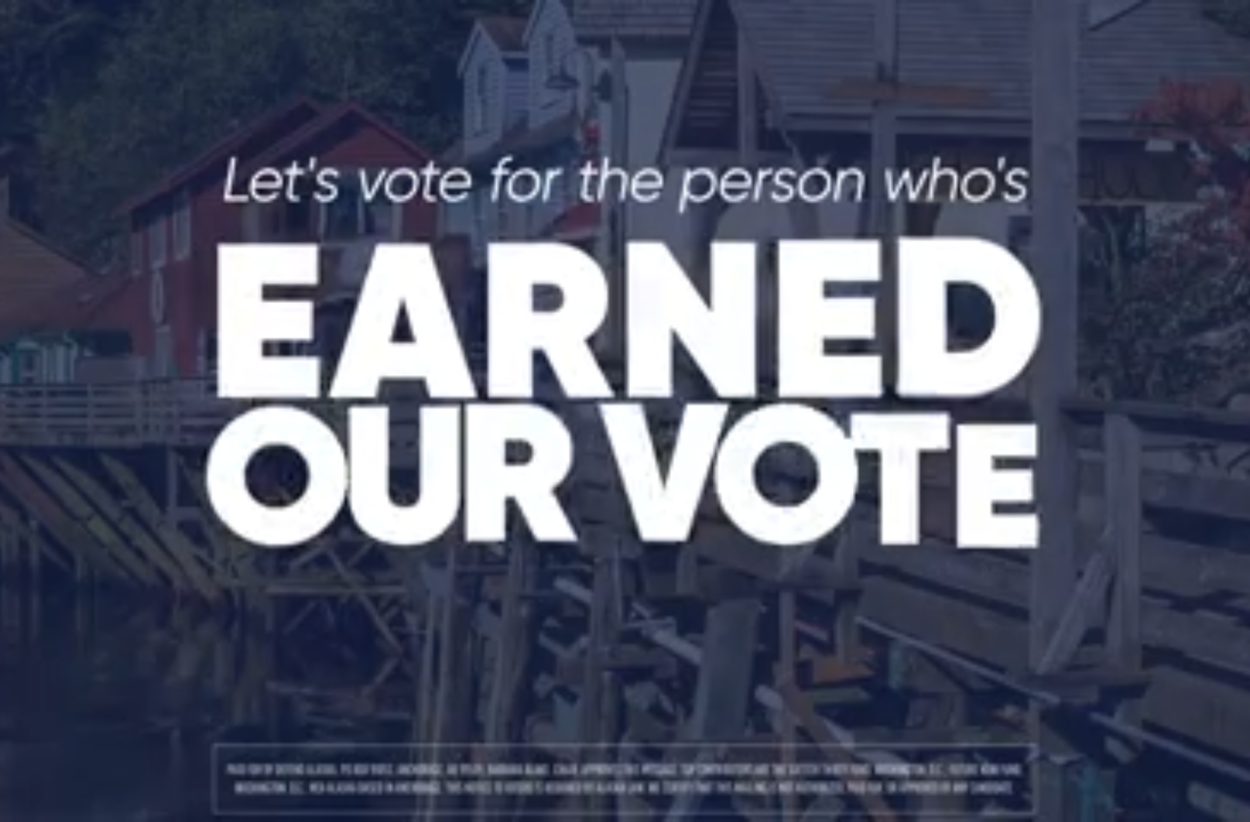
A screenshot from an ad paid for by an independent group called Defend Alaska targeting the House District 36 race. (Facebook)
With election season almost at a close, Alaskans are nearly done with an onslaught of political ads. Candidates for House District 36 and outside groups have put thousands of dollars to work with political mailers, radio ads and digital spots.
If you turned on the radio in Ketchikan in the past few weeks, you probably heard something like this:
“Hello, this is Dan Ortiz and I’m running for reelection to the Alaska State House of Representatives. I believe in that founding principle spoken by Lincoln at Gettysburg…” says one ad.
“Hello, this is Leslie Becker and I’m running for the Alaska House of Representatives because I’m tired of my opponent, Dan Oritz talking out of both sides of his mouth,” says another.
They’re ads for candidates for state House District 36 — independent incumbent Dan Ortiz and Republican challenger Leslie Becker. Each of their campaigns have amassed upwards of $75,000, and they’re putting it to work on the airwaves, in mailboxes, newspapers and online.
Ortiz’s biggest contributors are labor groups, plus a range of district residents and business owners, along with some individuals outside southern Southeast.
Becker has raised about $80,000. The majority — some $50,000 — comes from her own pocket.
Other contributors include party groups, Southeast residents and business owners — but also some prominent Republicans, including Gov. Dunleavy’s former chief of staff Tuckerman Babcock and Anchorage Republican state Sen. Laddie Shaw.
Becker’s campaign has sent mailers painting Ketchikan incumbent as “Liberal Dan Ortiz,” suggesting he’s out of step with the Republican-leaning House district. Asked about the tone of the mailers during a forum on Wrangell’s KSTK, Becker says she’s had to take the initiative.
“Well, I believe that my, you know, my campaign is pretty aggressive. And I’m going out after some things that I’m concerned about,” Becker said.
Ortiz rejected the liberal characterization, calling the mailers “negative” and “false.” He claims his campaign has tried to take the high road.
“So, you know, I’ve never done that. I’ve never used that against any of my previous candidates. And I have not used that against Leslie Becker as well,” Ortiz said.
But that doesn’t mean attack ads against Becker haven’t aired in the district.
“Becker promotes mine projects, like Pebble, that could hurt our fisheries, and made racist comments about our Alaska Native brothers and sisters, refusing to apologize,” says an ad paid for by a group called “Defend Alaska.”
It calls itself a non-partisan group, and it’s spent nearly $20,000 in the House District 36 race. It’s bought mailers, radio and digital ads — all criticizing Becker’s policy positions such as her avowed neutrality on the controversial Pebble Mine near Bristol Bay.
Ortiz claims to distance himself against the group’s ads. The group says it doesn’t consider its messaging to be hostile.
“I don’t think that we are running negative ads,” said Emily Fitzgerald. She’s a medical student in Idaho, originally from Ketchikan. She’s on Defend Alaska’s board.
“I just see it as a comparison of facts,” she told KRBD.
The Anchorage-based group is working in elections all over the state. It’s backed independents, with some Democrats and moderate Republicans receiving support as well.
Defend Alaska official purpose in its state paperwork says it supports candidates it believes serve Alaska’s “long term interests” and opposes “those that do not.”
“So I think, you know, the main focus there is making sure that we have enough funding to be able to support bipartisanship and really be able to defend Alaska and the leaders that put that aside for the well being of the state,” Fitzgerald said.
It’s raised nearly a half-million dollars this campaign cycle. Of that, some $150,000 comes from the liberal-leaning Future Now Fund.
Future Now’s spokesperson Simone Leiro said the D.C. group’s interest in Alaska is keeping the bipartisan coalition in the House.
“There’s an opportunity to advance working, you know, across party lines to achieve the goals that are most important to working families across the state,” Leiro said in a phone interview.
Other top contributors for Defend Alaska include the Sixteen Thirty Fund — that’s a progressive D.C. group — as well as unions.
Becker’s campaign hasn’t attracted as much money from Outside political campaign groups. Rather, about two thirds of the campaign is from her own pocket.
But if she wins, she could still break-even: Alaska’s legislators earn a salary of about $50,000 a year.





